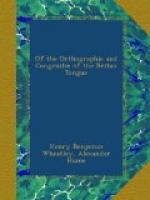4. First, for peple they wryte people, I trow because it cumes from populus; but if that be a reason, I wald understand a reason quhy they speak not soe alsoe. Or gif they speak not soe, I wald understand quhy they wryte not as they speak. I knawe they have the exemple of France to speak ane way and wryte an other; but that exemple is as gud to absorb the s in the end of everie word. Al exemples are not imitable.
5. They use alsoe to wryte logicque, musicque, rhetoricque, and other of that sorte, with cque. If this be doon to make the c in logica, etc., subsist, quhy wer it not better to supply a k in the place of it, then to hedge it in with a whol idle syllab; it wer both more orthographical and easier for the learner, for c and k are sa sib, that the ane is a greek and the other a latin symbol of one sound. In this art it is alyke absurd to wryte that thou reades not, as to read that thou wrytes not.
6. We use alsoe, almost at the end of everie word, to wryte an idle e. This sum defend not to be idle, because it affectes the voual before the consonant, the sound quherof many tymes alteres the signification; as, hop is altero tantu_m_ pede saltare, hope is sperare; fir, abies, fyre, ignis; a fin, pinna, fine, probatus; bid, jubere, bide, manere; with many moe. It is true that the sound of the voual befoer the consonant many tymes doth change the signification; but it is as untrue that the voual e behind the consonant doth change the sound of the voual before it. A voual devyded from a voual be a consonant can be noe possible means return thorough the consonant into the former voual. Consonantes betuene vouales are lyke partition walles betuen roomes. Nothing can change the sound of a voual but an other voual coalescing with it into one sound, of q_uhi_lk we have spoaken sufficientlie, cap. 3, to illustrat this be the same exemples, saltare is to hop; sperare to hoep; abies is fir; ignis, fyr, or, if you wil, fier; jubere is bid; manere, byd or bied.
7. Yet in sum case we are forced to tolerat this idle e; 1. in wordes ending in c, to break the sound of it; as peace, face, lace, justice, etc.; 2. behind s, in wordes wryten with this s; as false, ise, case, muse, use, etc.; 3. behind a broaken g; as knawlege, savage, suage, ald age. Ther may be moe, and these I yeld because I ken noe other waye to help this necessitie, rather then that I can think anye idle symbol tolerable in just orthographie.
OF THE ACCENTES OF OUR TONGUE.
Cap. 9.
1. Seing that we fynd not onelie the south and north to differ more in accent then symbol, but alsoe one word with a sundrie accent to have a diverse signification, I com_m_end this to him quho hes auctoritie, to com_m_and al printeres and wryteres to noat the accented syllab in everie word with noe lesse diligence then we see the grecianes to noat their’s.




